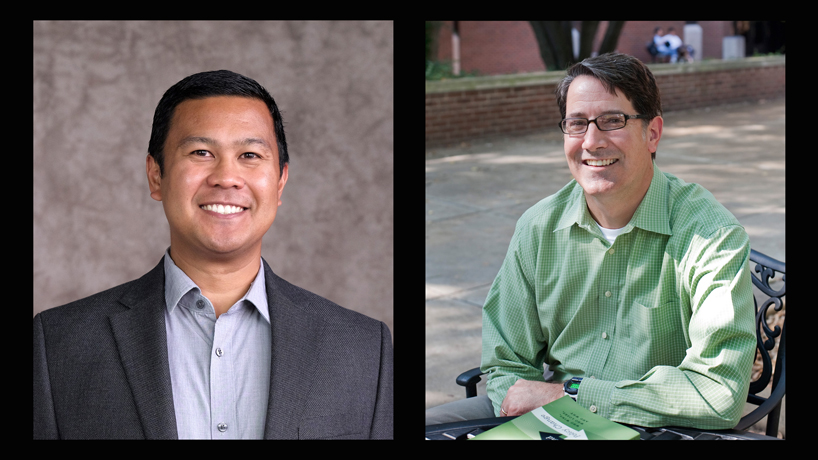
Political scientists Adriano Udani, left, and David Kimball wrote about their research into perceptions of voter fraud in The Washington Post. (Photos by August Jennewein)
A pair of University of Missouri–St. Louis political scientists have weighed in on the ongoing debate over voter fraud that picked up steam last week with President Donald Trump’s uncorroborated statement that 3 million to 5 million people voted illegally in November’s election.
Assistant Professor Adriano Udani and Professor and Graduate Director David Kimball published an analysis Wednesday in The Washington Post based on their own research into voter fraud perceptions.
They cite peer-reviewed studies that have shown that “voter fraud is extremely rare and difficult to prove,” yet a portion of the public still holds fast to the notion Trump is pushing that voter fraud is rampant in American elections.
“So who is likely to believe him?” Udani and Kimball’s article asks.
Their research shows a strong correlation with Americans who are hostile toward nonwhite immigrants. “That hostility strongly influences estimates of how frequently voter fraud occurs,” they write.
In a national survey they conducted through the 2015 Cooperative Congressional Election Study only a few months after Trump launched his candidacy, they asked 1,000 adult Americans to estimate how often voter fraud occurs and, likewise, measured their resentment of immigrants.
The results show that “resenting immigrants is the strongest predictor of believing in rampant voter fraud, even after controlling for conventional political dispositions and socioeconomic characteristics.”
Other factors such as support for Trump, distrust of the government, resentment of blacks and partisanship were also predictive, with Democrats and independents less likely than Republicans to believe in widespread voter fraud. But none of those factors correlated as strongly as resentment of immigrants.
Their work, still under review before it will be fully published, also zeroed in specifically on attitudes toward nonwhite immigrants.
To do so, they asked 1,000 respondents to use a “thermostat rating” to indicate their feelings about Irish immigrants, with the coldest feelings registering a zero and the warmest a 100.
The same people were randomly asked the same question, but instead of sharing their feelings about Irish immigrants, they were asked to do so about African, Chinese or Mexican immigrants.
The responses about attitudes toward Irish immigrants were used as a baseline against which to measure attitudes toward the other groups.
“We found that feelings toward Irish immigrants do not affect a person’s beliefs about voter fraud,” Udani and Kimball write. “But people with colder feelings toward the other three are more inclined to think that voter fraud occurs very frequently. That’s especially true among people with less receptive views toward illegal immigrants, specifically Mexicans.”
Udani and Kimball argue that lawmakers are exploiting these negative attitudes while pushing for laws that restrict voting and depress turnout among voters of color.
Media Coverage:
The Washington Post














